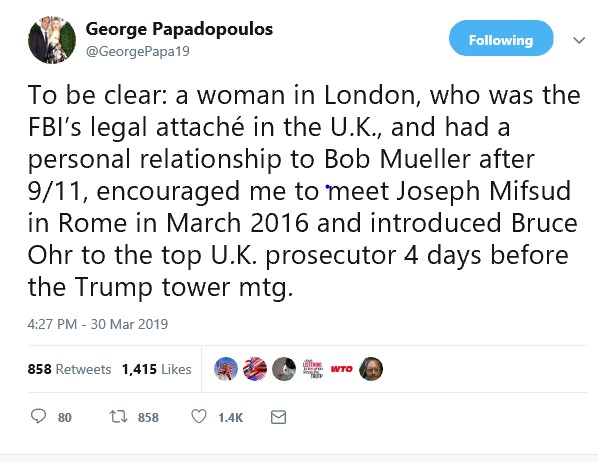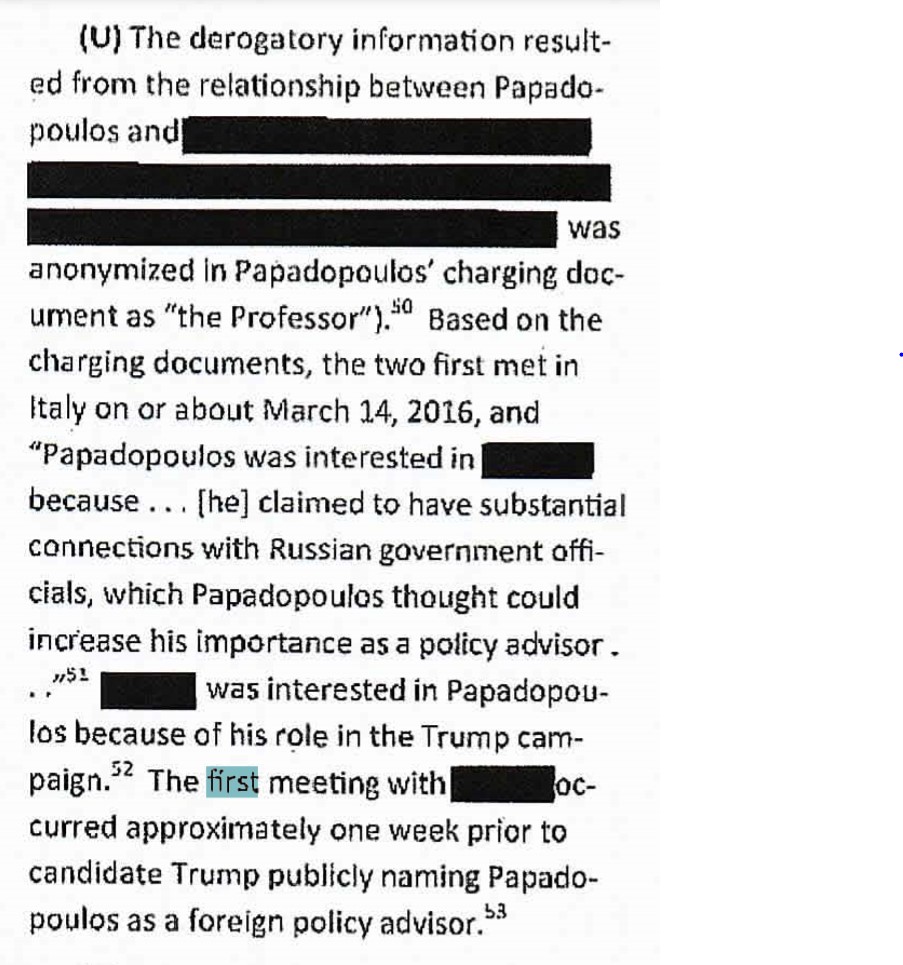Papadopoulos Hints Conversation That Launched Trump-Russia Probe Was FBI Setup These new revelations raise fresh concerns that, with the approval of the FBI, foreign governments were meddling in the 2016 election.Margot Cleveland
https://thefederalist.com/2019/04/01/papadopoulos-hints-conversation-launched-trump-russia-probe-fbi-setup/
The recently released transcript of George Papadopoulos’s congressional testimony reveals a significant fact: Papadopoulos’s introduction to Joseph Mifsud—the source of the “Russia has Hillary’s emails” tip that purportedly prompted the FBI to launch an investigation into the Trump campaign—was arranged mere days after Papadopoulos announced he was joining the Trump campaign.
Saturday evening, Papadopoulos rocked Twitter with claims that “a woman in London, who was the FBI’s legal attaché in the U.K.” encouraged him “to meet Joseph Mifsud in Rome in March 2016.” These new revelations raise fresh concerns that, with the approval of the FBI, foreign governments were meddling in the 2016 election.

Mifsud has long been a focal point of those on the right attempting to disembowel the Russia collusion hoax. The basics have been known for some time.
From court documents filed in connection to Papadopoulos’s guilty plea for lying to the FBI and from the House Permanent Select Committee on Intelligence’s (HPSCI) report on “Russian Active Measures,” we know that “on March 14, 2016, George met London-based college Professor Joseph Mifsud while traveling in Italy.” During that meeting, “Mifsud, then director of the London Academy of Diplomacy, claimed connections to the Russian Government.”
A week later, on March 21, 2016, Trump publicly identified Papadopoulos as one of his foreign policy advisors. Then on March 24, 2016, Mifsud traveled to London, “where he introduced George to a young woman named Olga,” telling the newly named Trump advisor that Olga was Russian President Vladimir Putin’s niece and suggesting they could arrange meetings with high-level Russian officials.
Then, continuing throughout the summer of 2016, Papadopoulos attempted “to arrange meetings between the Russian government and campaign officials,” working with Mifsud and Mifsud’s supposed Russian connections.
On April 26, 2016, Mifsud also shared a tip with Papadopoulos over a breakfast meeting in London: Mifsud told Papadopoulos “that he had just returned from a trip to Moscow where he had met with high-level Russian government officials,” and had learned that “the Russians had obtained ‘dirt’ on candidate Clinton,” namely thousands of Clinton’s emails.
Papadopoulos would later repeat this conversation to Australian diplomat Alexander Downer over drinks in a London bar in May. In late July, after WikiLeaks published a trove of stolen Democratic National Committee emails, agents at the FBI’s D.C. headquarters supposedly first learned of Papadopoulos’s statement to Downer, although it remains unclear how details of the conversation made it from Downer to the FBI.
Then, on July 31, 2016, purportedly on the basis of Papadopoulos’s advanced knowledge of Russia’s possession of the stolen emails, Peter Strzok initiated the Crossfire Hurricane federal investigation of the Trump campaign. The DOJ and FBI would later seek a Foreign Intelligence Surveillance Act order to surveil another Trump foreign policy advisor, Carter Page, and the FISA application reiterated the FBI’s claim that it had launched a counterintelligence investigation on July 31, 2016, after learning of Papadopoulos’s conversation with Downer.
Critics of the DOJ and FBI’s targeting of the Trump campaign have long suspected that Mifsud was a plant, seeking to set up the young Trump advisor, and possibly the presidential candidate and now president. But while investigative journalists have uncovered evidence connecting Mifsud to Western intelligence agencies and cozying up with Western government big-wigs, Papadopoulos’s meeting with Mifsud still seemed a happenstance.
After all, Papadopoulos met Mifsud on March 14, 2016, while traveling to Rome with the London center to which he was then connected, and Trump’s campaign did not announce Papadopoulos’s selection as a foreign policy advisor for another week.
In fact, in discussing the circumstances of Papadopoulos and Mifsud’s meeting, HPSCI’s report on “Russia Active Measures” notes that “the two first met in Italy on or about March 14, 2016,” and that “the first meeting with [Mifsud] occurred approximately one week prior to candidate Trump publicly naming Papadopoulos as a foreign policy advisor.”

But Papadopoulos’s congressional testimony reveals that his meeting with Mifsud was arranged by individuals who knew he would soon be joining the Trump campaign as a foreign policy advisor. Specifically, Papadopoulos testified that he interviewed with Trump campaign co-chair Sam Clovis around March 9 and March 11, and that while it was not publicly known until March 21 that he would be joining the Trump campaign, after he “finished [his] interview with Sam,” Papadopoulos knew he “would be joining the campaign.”
Significantly, Papadopoulos then testified that at the time of his interview with Clovis, he was “working for an organization named the London Centre for International Law Practice,” and that he “notif[ied] them shortly after that I’m going to be leaving and I’m going to go back to the United States and focus exclusively on working on the campaign. . . .”
And the clincher? Papadopoulos testified that at that point: “for some reason that I cannot remember to this day, they decided to invite me to go to Rome with them to this university or college named Link Campus. At the time, as far as I remember, I just thought I was going from London and then go back to the U.S.
“And I’m attending a conference there at this Italian, which I now have researched, and it seems to be some sort of western intelligence spying training center, where they had opposition members of the Libyan Government at the time at some conference with Italian officials and Joseph Mifsud was there. And I was introduced to Joseph Mifsud at Link Campus, and he took a liking to me, immediately once he knew that I would be working on the Trump campaign.”
Or at least that was the clincher before Papadopoulos took to Twitter on Saturday. In his weekend tweet, Papadopoulos implicated an FBI legal attaché working in the U.K. in the plot to put him in contact with Mifsud. The FBI agent, Papadopoulos claims, “encouraged [him] to meet Joseph Mifsud in Rome in March 2016.”

Mifsud has long been suspected of holding the key to efforts to target the Trump campaign. But Papadopoulos’s testimony and his tweet now implicate the amorphous London Centre for International Law Practice and the FBI in the plot to put Papadopoulos in contact with Mifsud. From there, Mifsud had but to groom Papadopoulos with promises of Russia connections that would allow him to shine in his new role as a foreign policy advisor to Trump.
It worked, and Mifsud’s supposed tip about the Russian hacking provided the FBI the pretext necessary to launch a full investigation into the Trump campaign for supposedly colluding with Russia.
While Special Counsel Robert Mueller has since established there was no collusion, more questions remain about the targeting of Trump. We can now add to those questions: Who arranged for Papadopoulos to meet Mifsud? Who ran the London Centre for International Law Practice? What was the FBI attaché’s role?
Were foreign governments or intelligence services involved? And what did the Obama administration, the CIA, the FBI, and the others involved in launching a counterintelligence investigation into a political opponent and presidential candidate know, and when did they know it?
Comments are closed.
